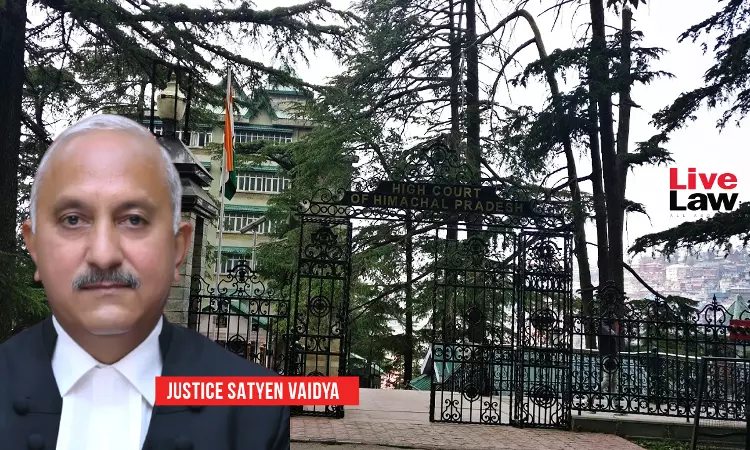- Home
- /
- High Courts
- /
- Himachal Pradesh High Court
- /
- State Can't Take Over Assets Of...
State Can't Take Over Assets Of Private Educational Institutions Without Compensation: HP High Court Awards ₹1.76 Crores to Sanatan Dharam Sabha
Mehak Aggarwal
28 Jun 2025 4:30 PM IST
The Himachal Pradesh High Court has held that even if the State is allowed to take over privately managed educational institutions, it can't do so without compensating the management for the immovable and movable assets developed by the private management. Justice Satyen Vaidya Observed: “The Himachal Pradesh Government notification dated 25.8.1994 allowing the state to take over...
The Himachal Pradesh High Court has held that even if the State is allowed to take over privately managed educational institutions, it can't do so without compensating the management for the immovable and movable assets developed by the private management.
Justice Satyen Vaidya Observed: “The Himachal Pradesh Government notification dated 25.8.1994 allowing the state to take over privately managed colleges and the services of their staff, does not authorize the State to take over assets of privately managed educational institutions without payment of compensation”
Background Facts:
The plaintiff, Sanatan Dharam Pratinidhi Sabha, is a registered society under the Societies Registration Act, 1860. In 1961. It established a degree college named Goswami Ganesh Dutt Sanatan Dharam College at Baijnath, District Kangra, Himachal Pradesh.
In 1998, another affiliated society named Goswami Ganesh Dutt Sanatan Dharam Education Society, Baijnath was formed with the objective of establishing, maintaining, supervising and controlling institutions such as colleges and schools in Himachal Pradesh.
The college infrastructure, including buildings, library, laboratory equipment, furniture, and furnishings, was developed over the years through the funds and efforts of the Sanatam Dharam Sabha and its affiliated society.
However, in 2007, the State Government took over the management of college along with all assets and liabilities through a notification, but without providing any compensation.
Aggrieved, the Sanatam Dharam Sabha filed a civil suit seeking compensation of ₹2.40 crores from the State, along with 18% interest.
Contentions:
The Sabha contended that the State had taken over the college and its assets without permission and without paying any compensation. It argued that this amounted to unlawful deprivation of property, violating Article 300A of the Constitution, which protects a person's right to property except by authority of law.
The Sabha also submitted that it had served legal notices under Section 80 of the Code of Civil Procedure before filing the suit, but received no response from the State.
In response, the State contended that it was authorized to take over privately managed colleges under a Himachal Pradesh government notification issued in 1994. It claimed that parts of the college infrastructure were created using funds from the University Grants Commission, and that the college had been receiving 95% salary grant-in-aid from the State since 1984. They argued that since public funds were involved the Sabha's claim for compensation was either unjustified or exaggerated.
Findings:
The Court observed that the Sabha had only sought compensation for assets taken over by the government and had not sought cancellation of takeover or reversion of the property.
It remarked that it is not denied that the state is permitted to take over privately managed colleges but it does not authorize them to take over assets of privately managed educational institutions without payment of compensation.
Citing Article 300A of the Constitution of India, the Court reaffirmed that the right to property is a constitutional right, which states no person shall be deprived of their property except by authority of law. This means the government can acquire property, but only through a valid legal process, not merely by an executive order.
It was established by the Sabha that it had built the college infrastructure from its own resources since 1961. Therefore, the mere fact that the land on which the college was built belonged to the State Government did not prevent the Sabha from claiming compensation for the structures. The evidence on record showed that the Sabha's possession was permissive and that it had constructed the buildings with the implied consent of the state.
The Sabha also sought compensation for the college's movable assets, such as books, furniture, furnishings, and laboratory equipment. The State did not claim that it had contributed to these items, nor did they provide any evidence to show they had. Therefore, the State was liable to compensate the Sabha for these items as well.
Accordingly, the High Court held the State liable to pay a sum of Rs. 1,76,95,000/- along with interest at the rate of 6% to the College Sabha. However, no compensation was provided for the land as the Sabha was not the legal owner of it.
Case Name: Sanatam Dharam Pratinidhi Sabha v/s State of HP & others
Case No.: Civil Suit No.5 of 2008
Date of Decision: 23.06.2025
For the plaintiff : Mr. Bhupender Gupta, & Mr. Anand Sharma, Sr. Advocate with Mr. Janesh Gupta & Karan Sharma, Advocates.
For the defendants : Mr. Gautam Sood, DAG, for defendants No. 1 to 4.



